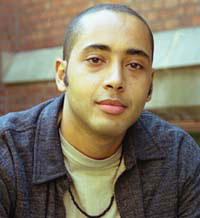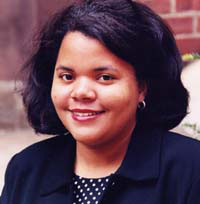Minority Postdoctoral Fellows
ERIC A. HURLEY
As many undergraduate students find, they start out with one ambition and along the way find another one. That was Eric Hurley's experience.
An artist interested in the way people think, Hurley chose advertising as his focus at the University of Florida, Gainesville. When he realized that advertising meant having to be a salesman, he decided that was not the path he wanted to pursue.
At the same time, Hurley was introduced to psychological research by participating in a study on bystander criticism for racism. That study looked at the responses of a group of white participants to Hurley's criticisms of racial prejudice being used against him (as the only black participant) versus those of another white student's criticisms of racial prejudice being used against Hurley. The study found that white participants were influenced more by the white person's complaints than by Hurley's. The study and the idea of doing research fascinated him.
Two professors who explored issues of race in their research also encouraged Hurley to pursue a degree in psychology. He decided to make his living doing work that would acknowledge his connection with and responsibility to others and to society.
His graduate studies were completed at Howard University-"the only place I applied, because I wanted to get my training while immersed in a community of black scholars," Hurley said. There he received his M.S. and Ph.D. in Developmental Psychology, focusing his dissertation research on Dr. A. Wade Boykin's Triple Quandary theory of African-American children's school experiences. That theory asserts that African Americans in the United States function in three realms of cultural experience: that of the mainstream, a past African-based culture and the experience of being a minority. The three realms often come into conflict since "mainstream culture often defines itself in contrast to what is believed about black people," he explained.
The theory argues that in educational contexts, many black children choose not to do well in school rather than to have their own cultural values undermined by a mainstream that does not value their ways of understanding and interpreting the world.
In his early research, Hurley set up an opportunity for students in a low-income neighborhood to learn in contexts structured to reflect different cultural modes. The mainstream mode stresses individualism and competition, he explained. The black children in the study predictably performed best in a communal learning context, one that stressed cooperation and shared responsibility while the white children in his study did better in and preferred the competitive and individual learning contexts.
Hurley's work at Teachers College will take that research further to determine what specific behaviors take place in communal learning groups that lead to black children's greater success. His dissertation study involved videotaping learning sessions and coding for specific types of behaviors. "I found different patterns of behavior in the way black and white kids relate to their study groups," Hurley said. For example, among the African-American children, Hurley found less disruption and fewer issues of coordinating member contributions. "It implies that they had more facility managing group interactions," he said. At TC he will again look at videotaped interactions and code for positive group behavior, "things that are specifically communal in behavior."
He will also be looking for a cultural variable referred to as "verve." Verve relates to the level and variety of environmental stimulation. Classroom settings normally encourage sitting quietly and listening, Hurley explained. There is evidence that African-American children are endowed by their home and community based formative experiences with a preference/tolerance for higher levels of verve. "School systems refuse to recognize that verve is how things function in the outside world," he added. "If more African-American children got through the school system successfully, they might have an advantage in work environments that demand 'multi-tasking' and teamwork."
Hurley's research won him the American Psychological Association's Jeffrey S. Tenaka Memorial Dissertation Award for Excellence in Graduate Research in 2001.
ERICA WALKER
As a mathematics major in her undergraduate years at Birmingham-Southern College, Erica Walker noticed that as she moved up into higher levels up mathematics through school, she saw less and less African-American students. She continued to notice the same trend after she received her master's degree from Wake Forest University and began to teach high school mathematics in Atlanta.
"I was the only black mathematics major in my college for quite awhile," she said.
Those experiences prompted her to think about ways to increase the participation of African-American students in advanced math classes. "Advanced math is critical because it increases your chances of going to college," Walker said. "There are more career options open to you."
There were limits to what she could do as a teacher. "I interacted with 150 kids as a teacher," she explained. "I felt that I wanted to have more of an impact, and I originally thought the best way to do that would be to become a principal or superintendent."
With that as her goal, Walker was admitted to the Department of Administration, Planning and Social Policy at Harvard University Graduate School of Education, where she began to examine in depth the experience of students of color in math classes. At the same time, she tutored local high school students.
Her dissertation, "On Time and Off Track: Advanced Mathematics Course-Taking Among High School Students," looked at who continues to take math classes and why, and for those who discontinue math studies, when they are likely to stop.
In her research, she conducted a statistical study of high school students' advanced math course taking. Since Algebra 1, she explained, is the gatekeeper course to advanced mathematics, she used discrete time survival analysis to determine whether or not students who enrolled in Algebra 1 by the end of ninth grade remained in math classes throughout high school. "My analysis was to tell me when students were likely to be most at risk of leaving the advanced math pipeline," she said.
Looking at samples of black and white students along with gender differences within those groups, she found that in general most students were at the highest risk to leave the pipeline in the last year of high school. White students, overall, showed no gender gap other than in the senior year, when white girls were less likely to take an advanced math course. African-American girls were almost as likely as white students to remain in the pipeline, but African-American boys were not. "Black boys are more likely to leave the advanced math pipeline by the end of ninth grade," she said.
Other areas she examined were school factors, socioeconomic status of the students, attitudes and aspirations and neighborhood characteristics.
As part of her fellowship, Walker plans to publish a series of articles from her dissertation and to augment her findings by doing research in New York schools. She wants to try to get to the root of what is happening with African-American boys in math as well as the gender differences between African-American boys and girls.
"I'm moving from a quantitative to a qualitative analysis," Walker said. "I think the academic orientation of students' peer groups or lack thereof is key to understanding why this phenomenon occurs."
Walker's research received an American Educational Research Association Dissertation Grant in 2000.
Published Monday, May. 20, 2002

